Abstract
When thinking on boosting global health through better diets, one might think on tackling hunger or malnutrition. And unfortunately hunger and malnutrition are still huge problems worth working on. I will try to focus on dietary habits. The effects of people making unhealthy food choices. Although basically everyone knows that a poor diet is “somehow bad”, there is emerging evidence on “how bad”. The average diet is too high in sodium and too low in whole grains, fruits, nuts and seeds etc. This reduces expected lifespan by many years and greatly reduces expected life quality. The effects seem to be higher than the effects of all mental illnesses or the effects of alcohol- and tobacco- consumption combined. Furthermore, these effects are putting a heavy burden on society through direct and indirect costs.
In most studies the effects of hunger, hidden hunger, malnutrition and bad food choices are mixed up. And there are different definitions of all these concepts. It is hard (at least for me) to present good data on the precise amount of the problem of "dietary habits" as subproblem of diets in general. But nourishment (hunger, hidden hunger, malnutrition, food choices etc.) is such a huge problem that even if dietary habits make up "only" a third of it one should consider these habits as a goal by itself. Tackling it needs different approaches.
More than half of the global population can afford a healthy diet.
Recently Prof. Dr. Matim Quaim quoted that 3 billion people can´t afford a healthy diet. I am confident, that he was referring to that document and the following figure was taken out of that source.
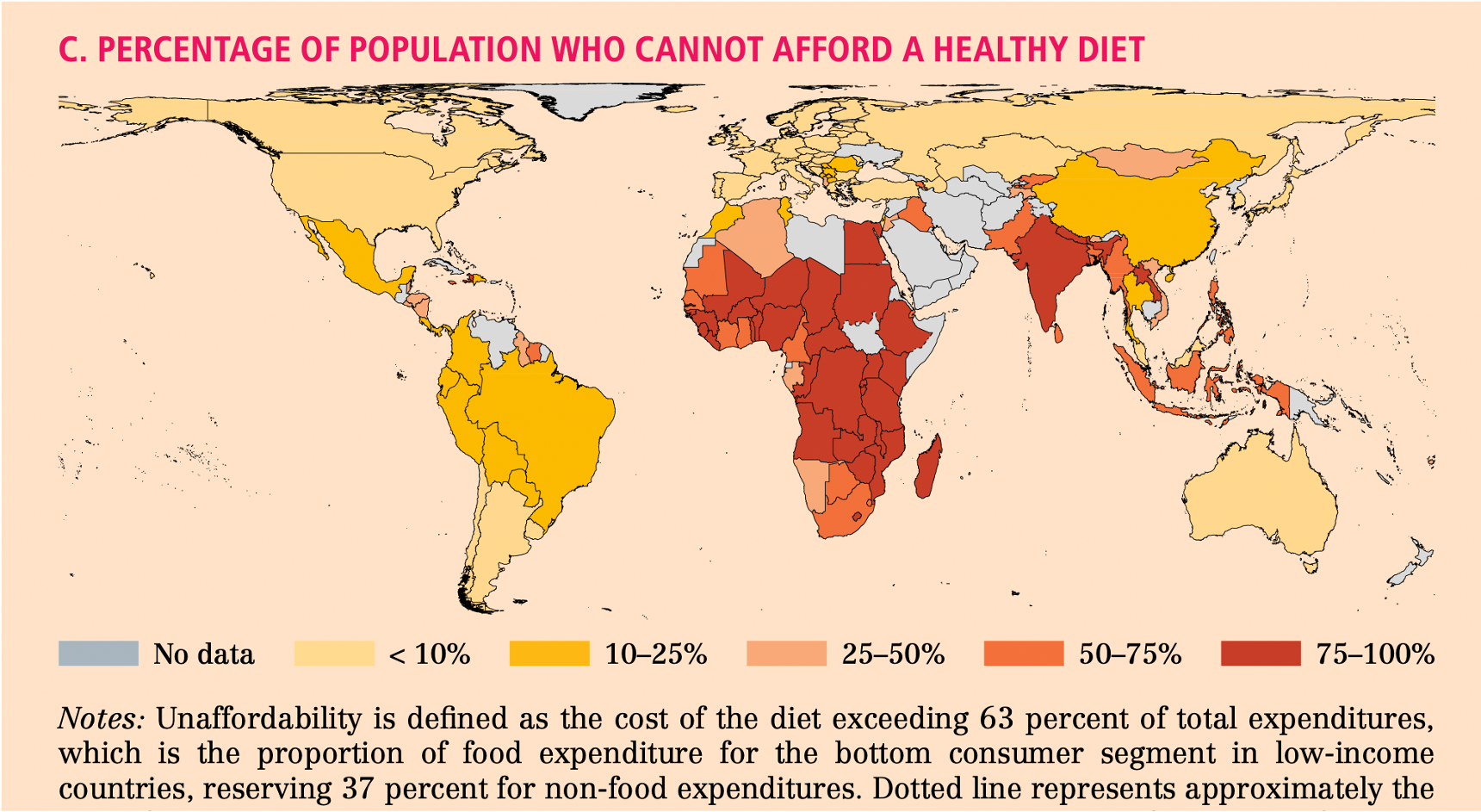
Everyone should be able to get a healthy diet in the first place. I don´t like arguing: "Even if you can´t afford a healthy diet, you are still making some - good or bad - important food choices. These choices affect your health!" But nonetheless: it is true. Even those people, who can´t afford a healthy diet might profit from better dietary habits.
So please keep in mind: "Some 5 out of roughly 8 billion people can afford a healthy diet, others could profit as well" while going through the rest of this post.
Global: Deaths, Life Quality and Costs of Top Diseases
The World Health Organization (Global Burden of Disease Study 2017) states that 75% of cardiovascular- some 70% of diabetes-diseases, as well as up to 40% of all cancers, could be prevented by addressing the following risk factors: tobacco consumption, lack of physical activity, and poor diets – the latter one being the most important factor. You´ll find the quote here as well. As stated above, dietary risks also include hunger, hidden hunger, undernutrition, etc., but at least for middle- and high- income countries it´s mainly on habits.
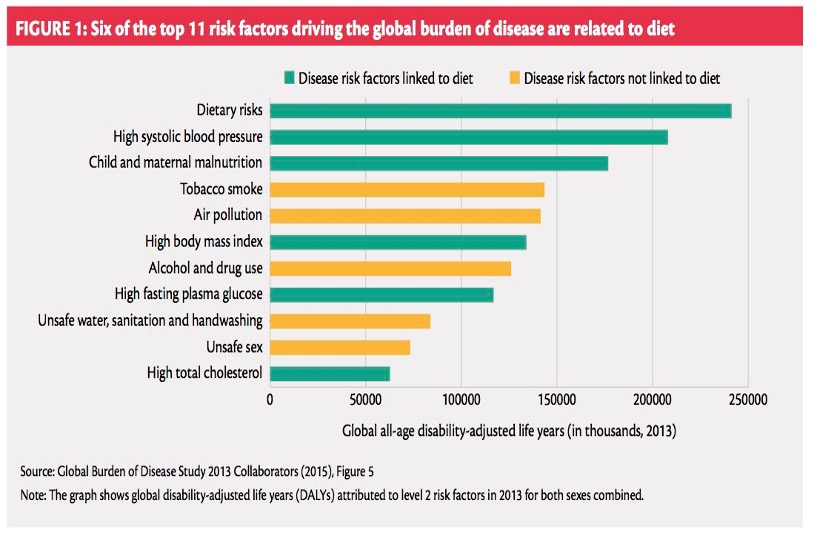
In 2017, 56 million humans died globally. Cardiovascular diseases caused roughly 18 millions of those deaths, while some 9 million deaths were due to cancer. Together, these two accounted for almost half of the total deaths in 2017. Diabetes accounted for another million deaths. These three diseases are heavily impacted by dietary habits.
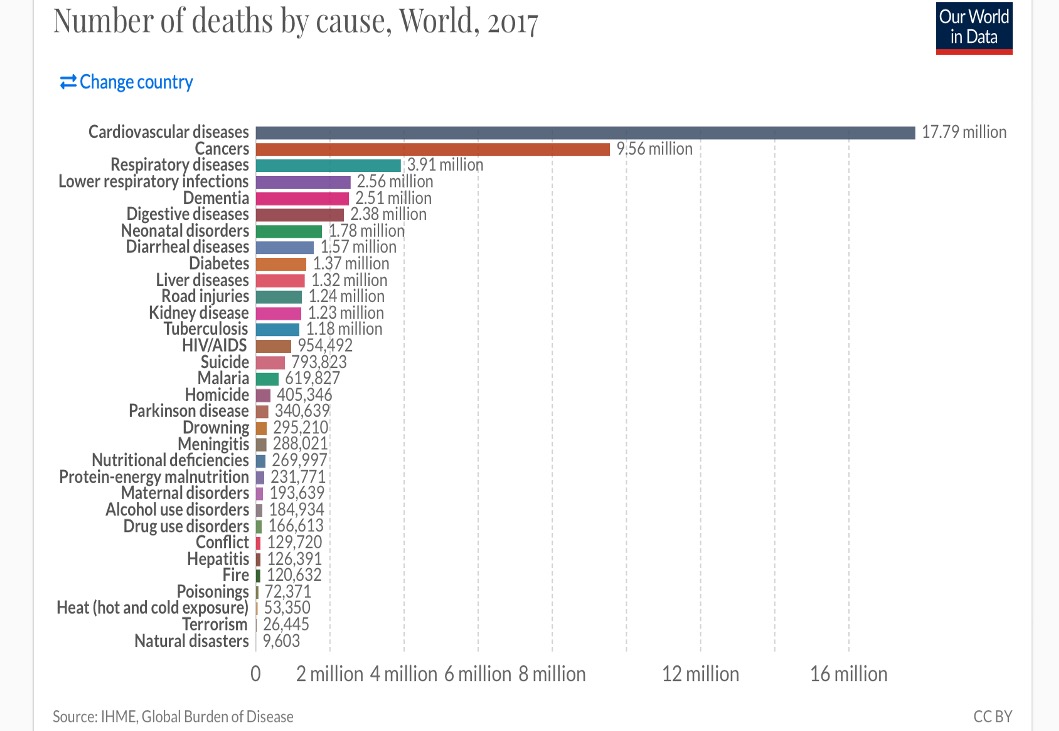
Quality of life:
Cardiovascular diseases amount to about 10% of lost disability-adjusted life years (DALYs) in low- and middle-income countries, and up to 18% in high income countries. This totals to at least 330 million DALYs/year (and does not account for life years lived with a disability). As for cancer, the global loss in DALYs is about 210 million per year, mostly due to premature death. Diabetes causes roughly 70 million DALYs per year. These Numbers add up to around 600 million DALYs per year. As 75% percent of all cardiovascular DALYs, 75% of diabetes DALYs, and 40% of cancer DALYs could be avoided by better diets, this number sums up on a yearly loss of about 380 million DALYs lost per year. A break down per country can be found here.
Costs:
After some calculations, the direct and indirect costs for heart diseases and stroke, cancer, diabetes and obesity (direct and indirect costs) add up to about one trillion dollars per year - and that is for the United States alone.
Summing up:
The most prevalent diseases cost many life years, greatly reduce life quality and cost a lot of money.
More Estimates on DALYs and Dietary Habits
This Lancet article states that 250 million DALYs are lost globally each year due to dietary risks. However, a more accurate number may be even higher for the following reasons:
- The article only considered those 25 and older.
- They claimed to have excluded obesity, which would add up to a some other 140 million DALYs/year but it is possible that some of these DALYs are already included in the cardiovascular DALYs.
- High systolic blood pressure, high fasting plasma glucose, high total cholesterol (accounting for a maximum of 200, 135, 115 and 60 million DALYs respectively) are also linked to poor dietary habits, but seem not to be included in those 250 Millions DALY.
On the other hand, a more accurate number may be lower as:
- I couldn't find a way to exclude undernutrition from this analysis. Undernutrition makes up for about 100 million DALYs, and hidden hunger accounts for another 100 million.
Therefore, the most cautious guess on dietary habits would start at about 50 million DALYs/year. That would be those 250 million DALYs/year minus hunger and hidden hunger ignoring all arguments why that number might be way higher. For comparison, The Global Burden of Mental Health Disorders (which includes drug abuse) stated that these where the cause for 140 million DALYs in 2017.
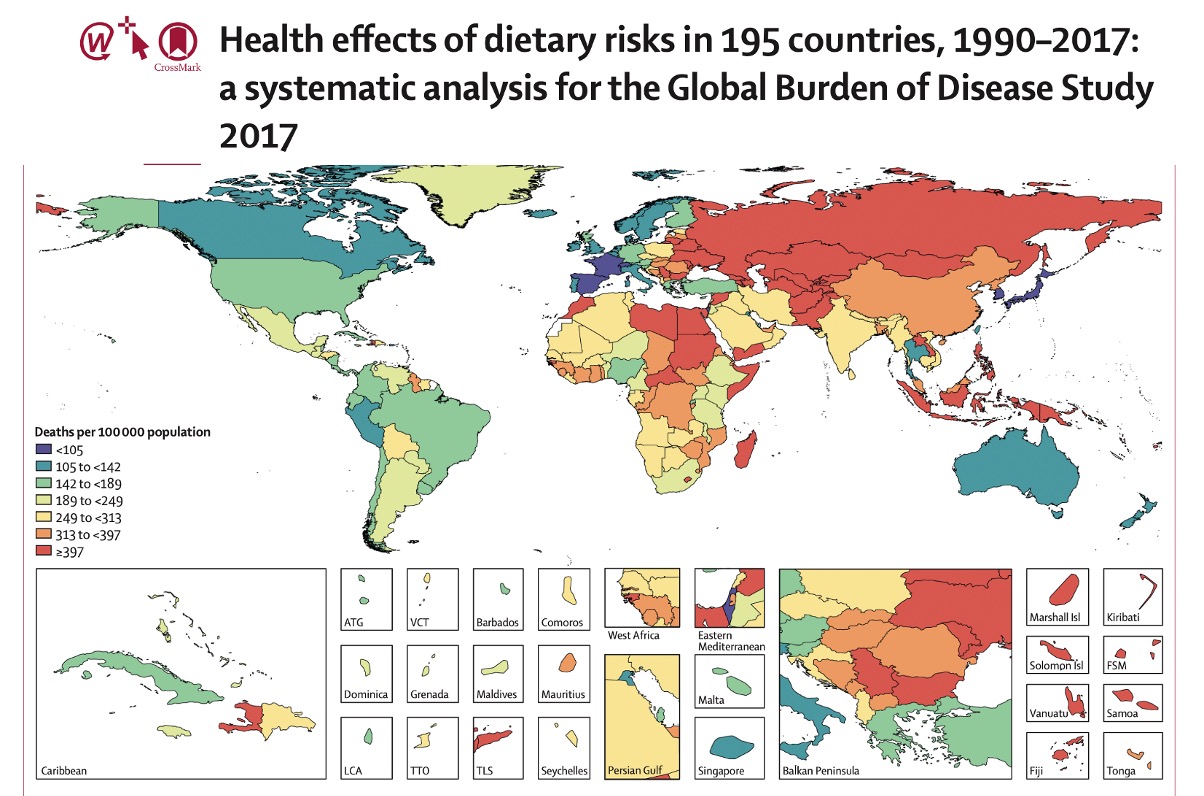
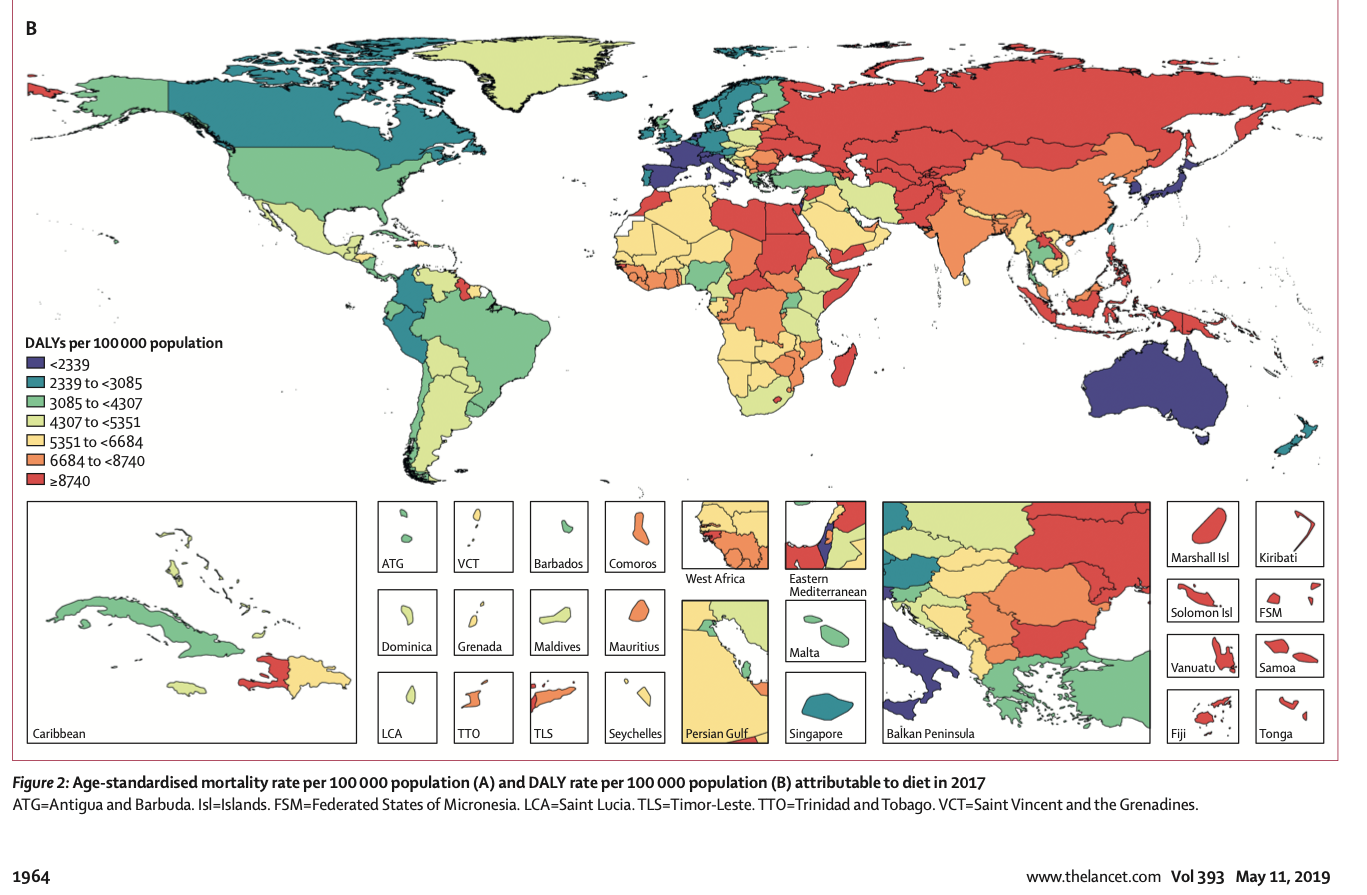
You will note, that the socio-demographic-index (SDI) correlates with DALYs lost per 100,000 population. Still: A lower loss in DALYs in those countries should not be translated into an argument like: “If people only have enough money – like most people in countries high on SDI – they get themselves a healthy diet anyway. Those DALY-losses are rather about poverty.” People in high-sdi-countries still have bad diets – but better healthcare. Better healthcare compensates some effects of bad dietary habits. (Simplified fun fact: As treating the effects of bad dietary habits cost roundabout a trillion dollar/year in the United States alone, having good dietary habits would save enough money, to end global poverty a couple of times, still being faced with the problem: “what do we do with the change?”). My altruistic aim would be: “Minimize the loss of DALYS” and it seems to be a fact, that those losses are lower in high-SDI-countries. But even in the United States the losses are huge, as I will show in the next section.
United States:
The US Burden of Disease Collaborators cite here, that even in the United States dietary risks are considered as risk factor number one for deaths (.5 of 2.7 million total deaths).
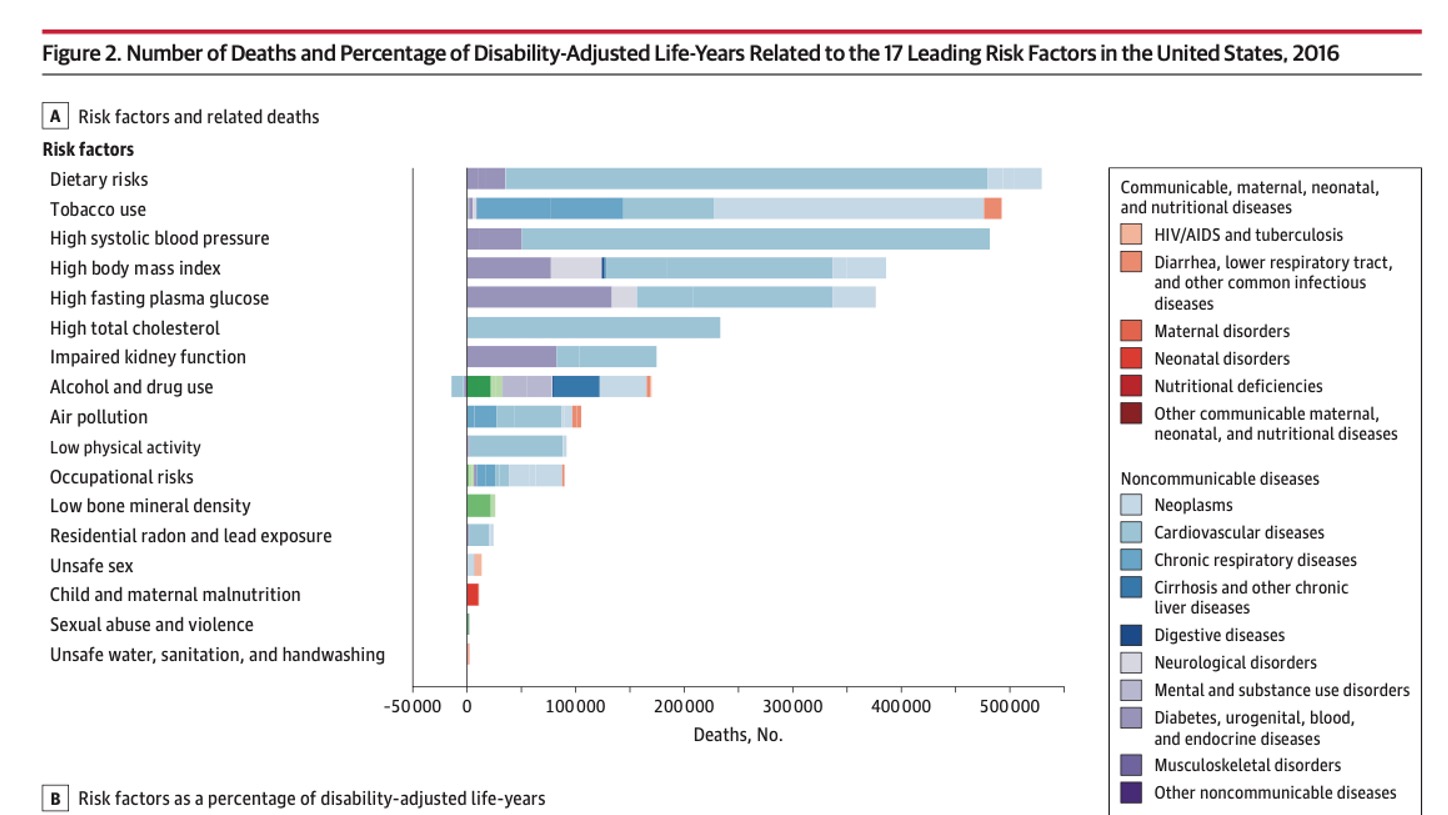
Tobacco is cited close behind in second place. Risk factors three, four, five, and six are high systolic blood pressure, high BMI, high fasting glucose, and high total cholesterol (close to .5, .4, .4 and .25 million respectively). Those risk factors are also linked to dietary habits and add up to about 1.5 million deaths. Therefore, dietary risks are the number one cause of death in the United States, but the true number might be up to four times higher (possibly 2.8 times higher is a better guess, given the impact of dietary risk factors on coronary heart disease (a subtype of cardiovascular disease), diabetes, stroke, and colorectal cancer).
To summarize:
1. Dietary habits are about thrice as relevant as causes of death as tobacco.
2. Roughly one in seven Americans smokes.
3. (Simplified) Conclusion: The average American diet is roughly half as harmful as smoking.
Sidenote: I am aware, that hunger and food insecurity are problems in the United States. But I am confident, that those basic claims are not affected.
A Healthy Diet
The physiological details are definitely fascinating. But this post is long enough anyway. Many effective altruists are familiar with the work of Dr. M. Gregor (and his team). His recommendations are mostly in line with the figures below. Basically it boils down to: “Plant based. Eat your fruits and veggies – And whole grains!”.
As for the Lancet study, the most prominent risk factors within “poor dietary habits” are noted as: high intake of sodium (3 million deaths, 70 million DALYs), low intake of whole grains (3 million deaths, 82 million DALYs), and low intake of fruits (2 million deaths, 65 million DALYs). These three factors are linked to 8 out of those 11 million annual deaths linked to poor dietary habits. Other prominent risk factors: diets low in nuts and seeds, low in vegetables, low in omega-3 fatty acids, and low in fiber.
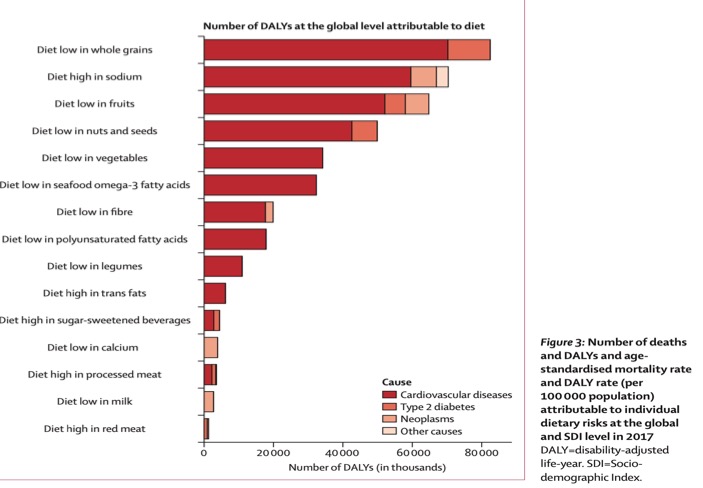
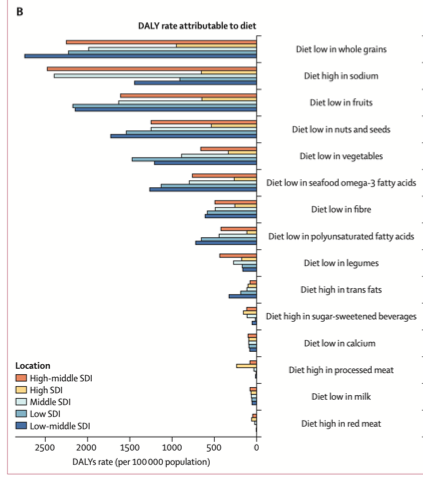
Some Notes:
- High processed meat consumption seems to be as low as risk factor 13? Maybe because some risk is already mentioned under “diet high in sodium”. High meat consumption is not recommended by basically all guidelines. Taking a look on the so called “Blue Zones” (those regions all over the world, where people tend to live the longest and healthiest lifes): They have a couple of things in common, as for dietary habits: diets there are pretty close to being vegetarian. Some more Information on meat consumption (life expectance, heart diseases, diabetes, weigh gain etc. are cited beginning at minute 58 of Dr. M. Gregors talk here.
- Fasting/ Intermittend fasting seems to have highly positive effects on many of the risk factors I have identified.
- Most people would reduce their intake in sodium through reducing their consumption of high processed foods. Throwing away the saltshaker should not be necessary. Cutting down on sodium alone would avoid 2,5 million deaths/ year.
- A diet low in whole grains is risk factor number one - even in low-sdi countries. Is it worth considering replacing some refined grain consumption with whole-grain consumption (even) there? It sure would have huge effects. Shouldn´t whole grains have a similar price tag? Still: Does one get the some amount of calories out of whole-grain consumption? If whole grains have to be more expensive, would it be worth the price? Would that price be affordable/ worth paying for those people ... ?
Dietary habits as (Sub-)Cause Area?
Dietary habits are:
- a big problem, affecting all humans (minus those who already have great dietary habits, minus those who don´t have dietary choices) - completely sure
- a neglected area – at least considering the size (confident about this opinion). There are programs and initiatives targeting this problem. But if one starts to make a rough estimate on how much work and resources per capita should be spend helping and getting people to healthy diets: I am sure we are way below that work and resources. If I imagine something threatening life expectancy by many years: Society would/should do a lot to prevent this threat. Society should do the same to lift life expectancy by those years. It´s just the other way round. Especially, as it is not only on life expectancy. It´s also about healthier lifes. So: I argue that this area is neglected.
- Better diets are an easily available solution. However, changing dietary habits again is more difficult, and ...
- It sure is against the interest of some lobby groups.
- Progress might be on its way anyway (like in most Cause-Areas?). But accelerating progress means a lot. My opinion: It still is important.
A healthy diet is affordable for most people, and for most people, it pays for itself. Better dietary habits should also be in the best interest of most governments. Some aspects of healthy diets are rather inexpensive, for example consuming whole grains instead of refined grains, lower amounts of sodium and vegetables and fruits (instead of meat).
One could start to identify the best steps towards healthier diets. Which steps would the easiest to achieve, which steps would have the largest impact? The last steps might not be worth the effort. But the first steps might be enough, for people living a couple of years longer (and in good health).
If one considers “Global Health” a cause area, dietary habits would make up a big part of it – maybe even the biggest (?). I cannot see this topic as a sub-topic of “(effects of) poverty”, “animal suffering” or “climate change” etc. I consider all of those topics important. Yet dietary habits would remain a huge topic, even in the absence of animal suffering, antibiotic resistance, climate change etc.
It might be important, but we should not work on it! Downsides?
As everywhere, there are opportunity cost of working/focusing on this area. And it sure is no x- or s-risk. For many people this might be the most important argument against working here. There is a lot to gain here – for sure. Not more – and not less.
Ideas for Taking Action
- Food and menu labeling
- Food-pricing strategies
- Laws, nudges, or subsidies (or stopping other subsidies)
- Work on better school- and kindergarten meals
- Mass-media-campaigns/ Enlightenment
- Targeting and educating physicians: If physicians give simple and brief advice on smoking, the benefits are huge. They should (be able) give consistent evidence-based advice on diets.
- Policies now focus mainly on sodium, sugar, and fat. That makes sense for sodium, but less for sugar and fat. Instead: Focus on sodium, (more) whole grains, (more) fruits and (more) nuts and seeds.
- Ask/ Join the Physician Association for Nutrition (www.pan-int.org or www.pan-usa.org) for more ideas.
Final remarks:
This is neither my area of interest nor expertise, but even after spending so many hours on this topic, I remain excited about the potential benefits of improving global dietary habits. People working in this field might have a huge impact. Therefore, I wanted to write that down. When I started, I thought I´d be done in a couple of hours… If you have smile on this though: You are not alone ;-)
This post would not have been possible without help. It would have been at least twice the length, filled with mistakes, without any nice figures and much less readable. Therefore, a special thanks to Aaron Gertler. All mistakes still in here are mine alone.
I stumbled across the topic of “dietary habits” via PAN (Physician Association for Nutrition). They started in Germany but are expanding to the United States (Link for the US-Website) I highly recommend them, their webinars and their videos, for example that one here: “How Food Determines Our Health”.
Thanks for reading.

Hej, yeah, living healthy only a decade longer is no sexy longterminst inifinite-live cause ;-)
Still. I recently stumbled over an small article in the New Scientist. As I had to make most calculations myself and ended saying, that humankind could increase their healthy lifespan by years, even by a decade - I´m happy to see, that others came to the same conclusions.
Here is the Link: https://www.newscientist.com/article/2307510-cutting-down-meat-and-dairy-could-help-you-live-up-to-a-decade-longer/
Best wishes and stay healthy!